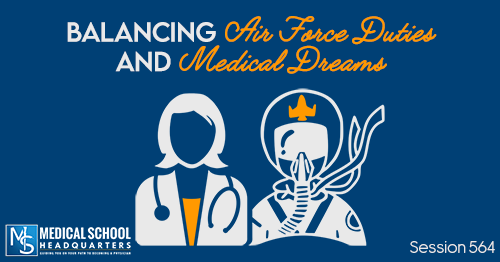Much advice for premeds floats around online; not all of it is good. The common myths addressed in this post might have been told to you by other premed students or people misinformed about the process and best practices. We’re here to prove that not everything you hear is accurate, and it’s essential to find what works for you and leave the rest.
Only people with “perfect” stats get into medical school.
Many students with less than stellar stats get into medical school, and many students with seemingly incredible stats end the cycle with no acceptances. You are more than your GPA and MCAT score. If you want proof, check out both Mission Accepted and Application Renovation. Both shows involve a deep dive into a student’s medical school application, where I identify what made them successful or what shortcomings they should work on if they reapply.
You have to participate in research to get into medical school.
It is true that many premeds do research while in undergrad and that some of those students will matriculate into medical school. But did every matriculant do tons of research while in undergrad or any at all? No. Courses focused on statistics, and research methods can show your ability to evaluate research without getting that first-hand experience.
Should you try research if it’s available to you? Sure, if you think you might enjoy it. Then, if you try it and find yourself hating it, do something else. Take that time you’re spending pipetting and doing literature reviews to find something you’ll enjoy doing. Prioritizing things you care about will make you a happier person. Not only should you enjoy as much of your time as a premed as you can, but it will also come through in your activity descriptions and interviews if you did something solely to meet an imaginary requirement.
There’s a perfect list of activities and amount of hours that will guarantee you a seat.
There are very few “musts” in this process, despite how it may seem when talking to other premeds, some advisors, or scrolling the forums. There’s also no set amount of hours to get, which means there’s no point where you can say, “Okay, I’ve got X hours, and I’m done.” It’s ideal to find a few things you’re passionate about doing and spend what time you can on them over a long period.
The one thing that’s a must in this category is that you need some clinical experience. Clinical experience is a must because it’s for your benefit. You need to prove to yourself that this is what you want to be doing. Ideally, you should get both experiences that involve patient interaction and shadowing experience. These will teach you different things, and so it’s worthwhile to get time in both if you can.
I should take my prerequisite courses at a community college for an “easy A” to boost my GPA.
Playing a game with your courses like this isn’t a good idea for multiple reasons. Medical schools will know or assume this is what you are doing if most of your classes are at a traditional four-year university except for your prerequisites and courses expected to be the hardest. This strategy will also not help you because community college classes aren’t inherently less rigorous. They might have different resources, but they can be and often are just as rigorous as the courses you would take at your home institution. You also have to be mindful of how schools view these courses and potentially not accept them to fulfill the prerequisites.
This decision to take community college courses will look different for nontraditional students. If you’ve already graduated and taking community college classes is the only way to afford or schedule the classes, that’s different. You have to do whatever you can to get the courses that you need, and your circumstances will be clear from the rest of your application.
If I make the perfect school list, I’ll definitely get in.
There’s also the idea that you should apply to upwards of 40 schools, which isn’t true. You can ultimately only attend one of those 40 schools, the costs will be prohibitive, and the quality of your application will suffer. Spreading yourself too thin while working on your primary application is counterproductive.
There are ways to make what will be a good school list for you, but there’s still no “perfect” list for you or anyone else. An easy trap to fall into is to make your list based just or even primarily on stats. You will do yourself more favors by first looking at their mission statement and whether that school’s mission fits your goals and priorities, and whether your activities demonstrate that these things (service, research, underserved communities) are also a priority for you. Also, look at what will make you happy in a school, even factors that can seem small in the face of stats like weather, location, and class size.
Once you have this extensive list where you’ve been ignoring stats, think realistically about how many schools you have the time and money to apply to. After assessing your bandwidth, it’s time to narrow your school list. You can get more information about building a school list in Session 304 of The Premed Years.
I got a C in a class, so I should choose a different career.
You can get a C in a prerequisite or other course and still get into medical school. You can even get multiple Cs or fail a class. If your GPA suffers a lot or all of these lower grades are in your prerequisites or other science courses, you may need to do a postbac to show your academic capability, but you can still do it if you put your mind to it.
There’s a perfect major or degree to pursue. I will either look better if I choose a challenging major or being in a demanding major will help excuse my poor or mediocre GPA.
Medical schools don’t evaluate your GPA differently based on whether you studied an “easier” or “harder” major or by the prestige of your undergraduate institution. You should study something you’re passionate about because you will likely do better, and you should get to enjoy your classes.
The one counter to this advice is that if you’re doing a master’s to show your academic capability, it does need to be a hard science, not something adjacent like a master’s of public health.
If I double major or pick up a minor, I look more impressive to medical schools.
Again, it doesn’t work this way. Medical schools don’t care what you majored in, and they also don’t care how many you had. If you want to study multiple things, go for it. There’s also the risk that completing multiple majors could divide your time and hurt your performance.
My classmates and I are competing for the top grade in the class or for a seat in medical school.
If you see everyone around you as your competition, this will be a lonely journey for you. There are indeed a limited number of students admitted to medical school each year. Still, the admissions committee isn’t comparing you directly to the person who sits next to you in intro bio. Everyone comes into this journey with different strengths, and you can all benefit from each others’ strengths.
What does this all come down to?
You shouldn’t be choosing courses, activities, or majors because of how it will look to medical schools. Choose them based on what you will get out of it. And if you are doing something you hate, don’t keep doing it just because you think you “need” to be doing it. You deserve to enjoy this journey as much as you can, and it’s a lot easier to write about something in essays or talk about it in interviews if you enjoyed doing it in the first place.
5 Common Mistakes Premeds Make with Extracurriculars







